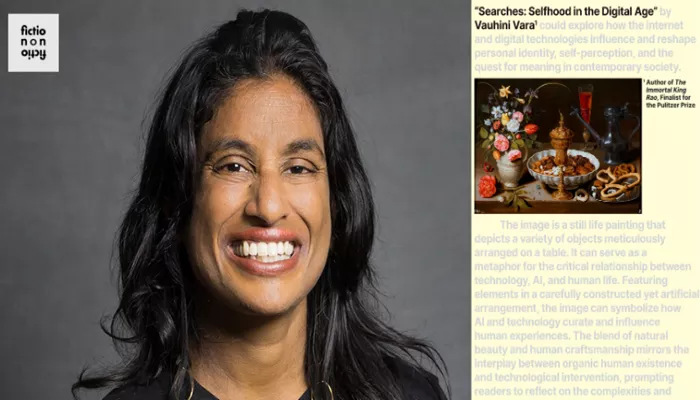Acclaimed novelist and journalist Vauhini Vara joins co-hosts Whitney Terrell and V.V. Ganeshananthan on the Fiction/Non/Fiction podcast to discuss her new essay collection, Searches: Selfhood in the Digital Age. Vara delves into the growing trend of the “loser tech bro,” internet privacy issues, and the implications of turning personal data, such as Google search logs, into art. She also reflects on the recent debate over the quality of an AI-authored short story that has gained attention.
To hear the full episode, subscribe via iTunes, Google Play, Stitcher, Spotify, or your preferred podcast platform. Alternatively, stream it directly from the podcast website, or explore video versions on Instagram and YouTube.
This episode is produced by V.V. Ganeshananthan, Whitney Terrell, Hunter Murray, and Vanessa Watkins.
Google Searches as a “Portal into the Depths of Human Desire”
In one chapter of her book, Vara explores her Google search archive, a feature that allows users to access their search history dating back to 2005. She reveals how she turned this data into a prose poem, reflecting on the personal and often revealing nature of these searches. Vara calls this archive “probably the most comprehensive record of my life” and compares it to other forms of documentation, such as diaries or emails.
“I found it intellectually moving and artistically interesting to take what belongs to Google and reconstitute it as literature I can call my own,” Vara explains. However, she acknowledges that while the act of turning these searches into art may feel like reclaiming ownership, Google continues to monetize this data, illustrating the complex power dynamics between users and tech giants.
The Addictiveness of Online Shopping
The conversation also touches on the addictive nature of the internet, particularly online shopping. Vara shares a personal experiment where she committed to reviewing every Amazon purchase she made, explaining why she chose to buy from the platform instead of alternatives. She details how this effort to discipline her consumption became more difficult over time, especially as holiday shopping approached.
Vara reflects on how personal decisions, like choosing not to shop on Amazon, can serve as a form of ethical self-regulation, even if they don’t directly challenge the dominance of such companies. This insight emerged after a conversation with a friend who chooses not to support Amazon or Whole Foods, not with the expectation of dismantling the company but to align her actions with her ethical principles.
Can Individuals Challenge Tech Monopolies?
While Vara doesn’t claim to have found a foolproof way to challenge tech monopolies, she emphasizes the importance of recognizing individual agency. “We need to consider alternative paths forward,” she says, suggesting potential solutions like nonprofit models, worker-owned enterprises, or public utility models that could provide technological services without concentrating power in the hands of a few large corporations.
Vara’s reflections on personal agency in the face of corporate power are central to her essay collection. She suggests that, although individuals may not be able to dismantle Amazon or Facebook on their own, recognizing one’s agency is the first step toward exploring new models that might better serve public interests.
For more of Vauhini Vara’s insights on technology, privacy, and the search for selfhood in the digital age, listen to the full podcast episode and explore her book, Searches.

